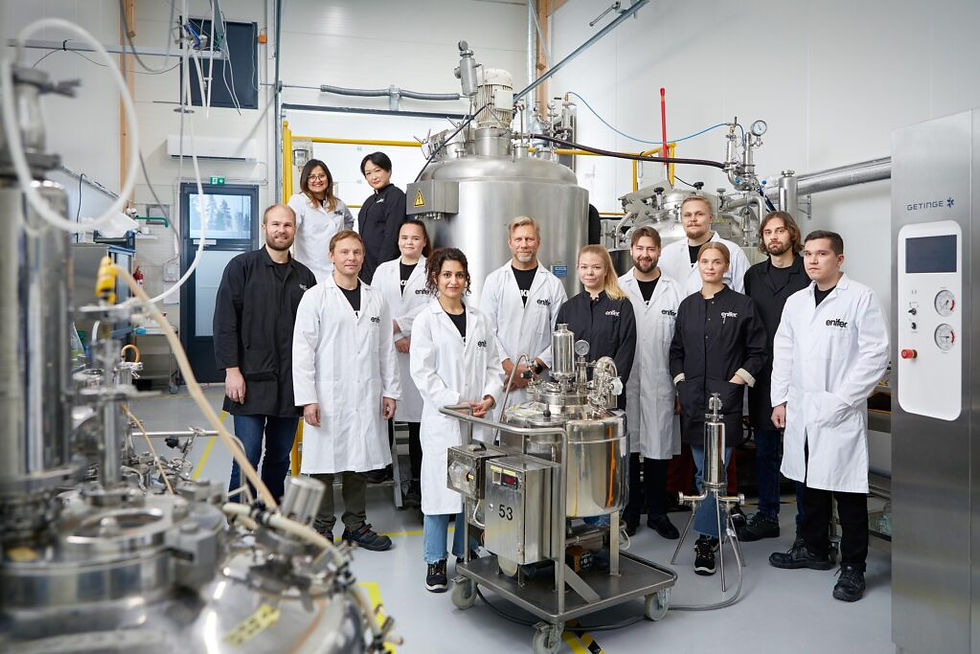Finnish Startup Enifer Secures U.S. GRAS Status for its Mycoprotein
- Marc Violo

- Sep 15, 2025
- 4 min read
Too long to read? Go for the highlights below.
Finnish food tech startup Enifer secures self-affirmed GRAS status in the US for its Pekilo mycoprotein, derived from a fungal strain used in Finland from 1975-1991
Company will open €33m commercial-scale factory in Finland in 2026, producing 3,000 tonnes annually with 98% lower emissions than beef
Regulatory delays in EU drive companies to seek US approval first, as novel food framework proves more cumbersome than American GRAS system
The concept of cultivating fungi for protein is not new. Between 1975 and 1991, Finland produced mycoprotein on an industrial scale using a fungal strain called Paecilomyces, feeding it on byproducts from the forest industry. As that sector evolved technologically, the protein production ceased and the knowledge lay dormant—until now.
Enifer, a spin-out from Finland's VTT Technical Research Centre, has modernised this Soviet-era process and secured regulatory approval to bring Pekilo mycoprotein to American consumers. The company has achieved self-affirmed Generally Recognized as Safe (GRAS) status following review by an independent expert panel, clearing the path for commercialisation in meat alternatives, dairy substitutes, baked goods, and snacks.
The timing proves fortuitous. Regulatory changes loom in the United States, where the government plans to eliminate self-affirmation procedures next year under direction from health secretary Robert F Kennedy Jr. This will make full FDA review mandatory for new ingredients, a more rigorous and time-consuming process.

The Science of Submerged Fermentation
Enifer's approach centres on continuous submerged fermentation, similar to brewing soy sauce. The Paecilomyces strain, originally selected from over 300 fungi, has been adapted to consume food and agricultural sidestreams rather than forest industry byproducts. Beyond standard glucose, the fungus can utilise sugar streams from food processing, creating value from what would otherwise be waste.
The fermentation process removes most water mechanically before drying and milling the mycelium into a fine, shelf-stable powder. This approach differs from competitors who typically maintain wet or fresh formats, offering logistical advantages in storage and transport.
The resulting ingredient delivers impressive nutritional credentials. Protein content varies by application: over 60% for pet food, up to 65% for aquaculture feed, and up to 50% for human consumption. The mycoprotein also provides dietary fibre whilst maintaining neutral taste and colour, plus strong water-holding capacity that complements existing plant proteins like soy and pea.
Scaling Beyond the Laboratory
Currently operating a pilot line producing five to 10 kilograms daily, with periodic campaigns at contract manufacturers achieving 10-fold increases, Enifer stands poised for dramatic expansion. The company secured €36 million through Series B funding, state-backed loans, and EU grants in 2024 to construct a commercial-scale facility in Kirkkonummi, Finland.

The €33 million factory, scheduled for completion by year-end with production beginning in the first half of 2026, will produce 500 kilograms per hour—sufficient to meet the protein needs of 40,000 people sustainably. The environmental impact appears compelling: one kilogram of Pekilo generates just 1.66kg of CO2 equivalent, representing 98% lower emissions than beef and half those of milk production.
The facility's initial focus will target pet food markets whilst the company pursues additional regulatory approvals for human consumption. This pragmatic approach reflects the complex regulatory landscape surrounding novel food ingredients.
Regulatory Geography and Market Strategy
Despite being an EU-based company, Enifer's path to market illustrates how regulatory complexity shapes commercial strategy. The company filed for novel food approval with the European Food Safety Authority (EFSA) in October 2023 and passed the initial eligibility check promptly. However, EFSA's framework ranks among the world's most rigorous, prompting many food tech companies to seek approval elsewhere first.
The contrast with American procedures proves stark. Self-affirmed GRAS status allows immediate commercialisation, though Enifer continues pursuing an FDA 'no questions' letter for additional market confidence. This more robust approval carries particular importance when courting large consumer packaged goods companies with stringent supplier requirements.

Similar applications are pending in Singapore and the UK, reflecting a multi-jurisdictional approach to market entry. The strategy acknowledges that regulatory timelines, rather than consumer demand or technical readiness, increasingly determine where novel food ingredients launch first.
Applications Across Food Categories
Pekilo's versatility extends across multiple food categories. The neutral-tasting powder shows particular promise in healthy snacking, where its combination of high-quality protein and fibre addresses consumer demands for nutritious convenience foods. Cost-efficient and shelf-stable, it suits blended meat applications, particularly processed formats like sausages and nuggets where powder integration proves straightforward.
The ingredient's complementary relationship with existing plant proteins offers formulators new flexibility in developing products with improved texture, nutrition, and consumer appeal. Rather than direct replacement, Pekilo functions as an enhancing ingredient that addresses multiple formulation challenges simultaneously.
Historical Precedent Meets Modern Demand
The revival of Pekilo demonstrates how historical innovations can find new relevance amid contemporary challenges. The extensive scientific literature from the 1970s and 1980s provides safety data that potentially accelerates regulatory review compared to entirely novel strains.
This historical foundation, combined with modern fermentation techniques and regulatory strategies, positions Enifer to capture growing demand for sustainable protein sources. With a Series C fundraise planned for Q4 2026 following factory commissioning, the company appears well-positioned to scale this Soviet-era innovation for 21st-century markets.
As regulatory frameworks evolve and environmental pressures intensify, Enifer's approach suggests that solutions to modern food system challenges may sometimes be found not in revolutionary new technologies, but in the thoughtful revival of past innovations adapted for contemporary needs.




